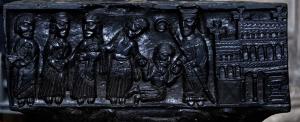
If we pay attention, Paul warns us against reading what he wrote in an overly-literal fashion. He knew he was using human conventions, conventions which have all kinds of limitations. Because the truth does not have any such limitations, conventions used to portray the truth must not be confused with the fullness of the truth itself. At best, conventions serve as pointers to the truth which lies beyond them. Some of the best conventions are metaphoric, that is, they point to the truth through analogy. Those who do not understand metaphor and poetic diction end up trying to engage the convention as if it were not a mere pointer but the thing in and of itself. This can, and often does, lead to people finding contradictions in the presentation of the truth because the different analogues used to represent the truth do not entirely agree with each other if they are engaged on the simple, the literal level. Thus, when talking about human freedom, Paul warned his audience that he was presenting the topic through “human terms,” hoping by giving such a warning, they do not take all he said literally:
But thanks be to God, that you who were once slaves of sin have become obedient from the heart to the standard of teaching to which you were committed, and, having been set free from sin, have become slaves of righteousness. I am speaking in human terms, because of your natural limitations. For just as you once yielded your members to impurity and to greater and greater iniquity, so now yield your members to righteousness for sanctification (Rom. 6:17- 19 RSV).
We are set free from sin, and yet, if we take the convention literally, we find ourselves bound to a new kind of slavery, that is, to righteousness. What kind of freedom is that? Paul wants us first to understand the way sin dominates and controls us, eliminating our freedom or ability to do what is good and just, turning us, indeed, into slaves to sin with all kinds of bad habits which are difficult to overcome. Then he tells us we overcome that slavery with the freedom we find in Christ, a freedom which allows us to do that which is good, that which will bring us peace. When we engage that freedom, when we do that which is good, we become attracted to the good in and of itself, and God, the source and foundation of that good, so that we freely embrace and find ourselves becoming attached (or bound) to it. Paul’s conventional word choice is meant to help us understand that we will find ourselves bound to the good, and not that we will find itself imposing itself upon us and restricting our freedom. It is sin which limits our freedom, and turns us into its slaves, while grace frees us from that slavery
This is why, having used the metaphor, “slave” to represent our newfound connection to what is good, Paul reiterates we are free, we are able to do the things we want to do (by nature). Sin corrupts us from within, slowly destroying our potential and with that, our freedom; if left unchecked, it leads to our annihilation, that is death: where there is no life, no existence there is no freedom of any kind. Now, as Christ has overcome death by death itself, death no longer is the end, and so sin has had its sting removed, Slowly, we find ourselves being made free, being given grace, and through that grace, given more and more life, and with it, the potential we need to truly be free.
We can, from time to time, in our temporal existence, find ourselves slipping back, falling for our old ways and habits, and experience, for time, sin trying to regain power over us in our lives. But due to what Christ has achieved, it does not have to have the final say – every time we slip up, Paul says, we should remember our dignity and what has been given to us by Christ. When we do so, we will find that no matter how much sin wants to lead us to perdition, Christ has set us free:
But then what return did you get from the things of which you are now ashamed? The end of those things is death. But now that you have been set free from sin and have become slaves of God, the return you get is sanctification and its end, eternal life. For the wages of sin is death, but the free gift of God is eternal life in Christ Jesus our Lord (Rom. 6:21-23 RSV).
Truly, it is not the way Paul talks about slavery, even slavery to sin, but rather, the way Paul talks about freedom, the freedom granted to us by grace, which is the point of his words. He wanted to show there are two ways we can be bound, one to sin, where sin controls and dominates us and we lose our freedom from it, and the other to that which is good, and how, through such a connection with the good, we find ourselves receiving true freedom. We have experienced the power of sin and corruption in our lives. We can understand how it can be designated as a kind of slavery, one where a terrible lord, death, waits to gain total control over us, seeking to obliterate us from existence. Christ has taken down that lord. Death has been shown not to have ultimate control and power over us or anyone else. While we still have to face temporal death, but now it is just that, temporal, not eternal. Christ has broken the bonds of sin and death has become reconfigured so that even in death, we can find ourselves coming to Christ and receive freedom and grace. Death has a limit, the limit which Christ has set for it. Now, we can join in with Christ and find out what is to be found beyond death: eternal life with eternal joy and eternal beatitude, as we find ourselves participating in the divine life for eternity.
Stay in touch! Like A Little Bit of Nothing on Facebook.
If you liked what you read, please consider sharing it with your friends and family!
N.B.: While I read comments to moderate them, I rarely respond to them. If I don’t respond to your comment directly, don’t assume I am unthankful for it. I appreciate it. But I want readers to feel free to ask questions, and hopefully, dialogue with each other. I have shared what I wanted to say, though some responses will get a brief reply by me, or, if I find it interesting and something I can engage fully, as the foundation for another post. I have had many posts inspired or improved upon thanks to my readers.












